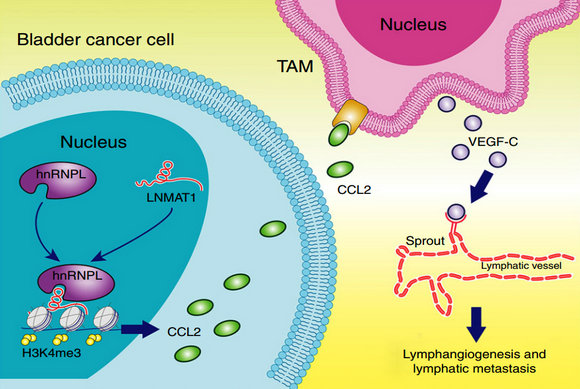Professor Tianxin Lin from Sun Yat-Sen Memorial Hospital Revealed the Key Molecular Mechanism of Lymphatic Metastasis of Bladder Cancer
Source: Sun Yat-Sen Memorial Hospital
Written by: Changhao Chen
Edited by: Wang Dongmei
Recently, the team of Prof. Tianxin Lin from Sun Yat-sen Memorial Hospital published a paper entitled “LNMAT1 promotes lymphatic metastasis of bladder cancer via CCL2 dependent macrophage recruitment” in Nature Communications. Prof. Tianxin Lin is the corresponding author and Dr. Changhao Chen, Dr. Wang He and Prof. Jian Huang are the co-first authors. This study clarifies that a plausible mechanism for LNMAT1-modulated tumor microenvironment in lymphatic metastasis and suggests that LNMAT1 may represent a potential therapeutic target for clinical intervention in lymphaticmetastatic bladder cancer.
Bladder cancer is one of the most common genitourinary malignancies, with approximately 429,800 new cases and 165,100 deaths annually worldwide. The probability of death from bladder cancer with lymph node (LN) metastasis is markedly higher than that from bladder cancer without LN metastasis. The death rate increases from 18.6% to 77.6% within 5 years, even when the bladder cancer is treated with radical cystectomy, and LN-metastatic bladder cancer patients with extranodular extensions have an even worse prognosis. Multiple independent studies have demonstrated that LN metastasis is a key prognostic factor in bladder cancer. Recently, the tumor microenvironment is comprised of diverse nonmalignant stromal cell types that are associated with bladder cancer progression and metastasis.However, whether targeting tumor microenvironment mediated LN-metastatic could be potential approaches for the therapeutic intervention of bladder cancer remains largely unclear.

Illustrative model showing the proposed mechanism by which LNMAT1 promotes lymphatic metastasis in bladder cancer via CCL2-dependent TAMs recruitment.
The research team of Prof. Tianxin Lin has long been committed to epigenetic regulation of lymphatic metastasis of bladder cancer. Previous experiments have identified several long non-coding RNAs (lncRNA) associated with lymphatic metastasis of bladder cancer by high-throughput sequencing. Among them, lncRNA-BLACAT2 can regulate the secretion of VEGF-C by bladder cancer cells by binding to WDR5 to promote lymphangiogenesis leading to lymphatic metastasis (J Clin Invest, 2018). However, some patients with bladder cancer who have low expression of BLACAT2 can also develop lymphatic metastasis, suggesting that other lncRNAs may regulate lymphatic metastasis through different mechanisms.
In the present study, the team of Prof. Tianxin Lin first identified an lncRNA-LNMAT1, which is upregulated in LN-positive bladder cancer and associated with LN metastasis. Through gain and loss of function approaches, LNMAT1 promotes bladder cancer-associated lymphangiogenesis and lymphatic metastasis. Mechanistically, LNMAT1 epigenetically activates CCL2 expression by recruiting hnRNPL to CCL2 promoter, which leads to increased H3K4 tri-methylation that ensures hnRNPL binding and enhances transcription. Furthermore, LNMAT1-induced upregulation of CCL2 recruits macrophages into the tumor, which promotes lymphatic metastasis via VEGF-C excretion. These findings provide a plausible mechanism for LNMAT1-modulated tumor microenvironment in lymphatic metastasis and suggest that LNMAT1 may represent a potential therapeutic target for clinical intervention in LN-metastatic bladder cancer.
Link to the paper: https://www.nature.com/articles/s41467-018-06152-x